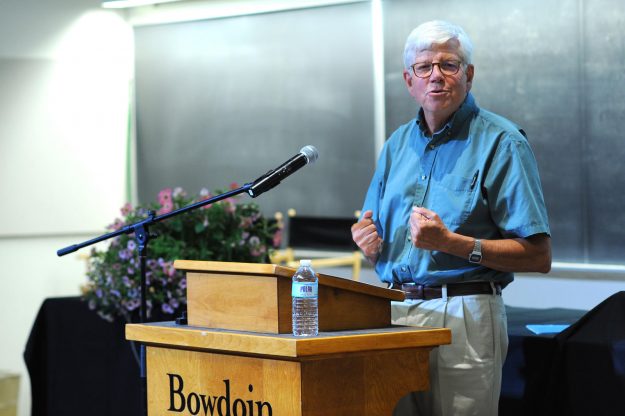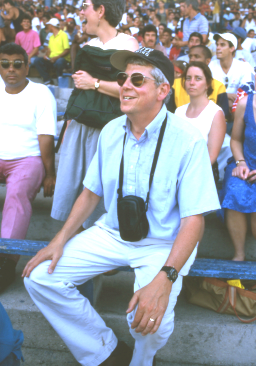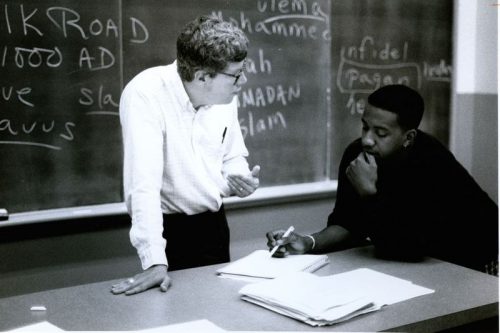Latin American Historian Allen Wells Reflects on Refugee Caravan and Career
By Tom Porter
As Professor Allen Wells looks at news coverage of the 7,000-strong Central American refugee caravan as it inches its away across Mexico toward the US, he has a strong sense of ‘deja vu.’ “I’ve seen something like this before, in the 1980s,” he recalls. “There were tens of thousands of Mayan Indians fleeing civil war in Guatemala, heading across the border into Mexico, desperately trying to get to the US. Many ended up in Mexican refugee camps—detention centers is a more accurate term—and some remained there for years.” Wells sees the same dynamic today, although then, he points out, the situation was driven by Cold War-fueled conflict, whereas today’s problems derive from violence associated with crime and corruption, as well as economic hardship.
Wells, who is the Roger Howell, Jr. Professor of History, says many of the current problems in the region known as the “northern triangle” (Honduras, Guatemala, and El Salvador) stem from a period of militarization aimed at countering the increasingly active drug cartels and gangs in the region. “This has led to a lot of corruption within the police and the military in those countries, where they have either become complicit in the drug trade or are simply paid to turn the other way. As a result, these countries have become more violent.” The police and the military are now part of the problem, he explains, although they enjoy the backing of the US, because they’re seen as a bulwark against the criminal gangs.
“US foreign policy is focused mostly on toughening up the defenses against the drug trade rather than dealing with the economic problem, and it needs to change,” says Wells. “We need meaningful immigration reform that addresses why these migrants feel compelled to leave in the first place. Currently, we have a 2,000-mile border and a US policy that has been mostly reactive, often based on domestic political concerns.” With the midterms approaching this is more apparent than ever, he says, as President Trump attempts to make political capital out of the caravan story, stirring up fears about dangerous immigrants heading to the US. One piece of meaningful reform, says Wells, would be to implement an enhanced guest worker program for Latin American immigrants, so that employers in the US can readily find the workers they need to address labor shortages north of the border. “Also, rather than threatening to cut off aid, our government should encourage economic initiatives in the northern triangle that promote job creation there.” says Wells.

Not a typical academic career
Allen Wells now has more time on his hands to ponder issues like the Central American refugee problem—but not that much more time. He taught his last class earlier this year after forty years of college teaching (thirty-one at Bowdoin). But he’s far from retired. Wells is taking his final year as a sabbatical, meaning he can immerse himself in his current book project on the struggle for Latin American democracy during the Cold War.
“Latin America during these years is often viewed in purely binary terms—countries were either pro-Washington or pro-Moscow, with little room for autonomy. This is not a fair representation, though.” Granted, the Cuban Revolution of 1959 did a great deal to polarize the region, he admits, but there were democracies in a number of countries, including Chile, Venezuela, and Costa Rica. “Moderate politicians, unhappy with what they viewed as Washington’s and Moscow’s simplistic ‘us versus them’ mindset, sought a different path, rejecting right-wing militarism and left-wing totalitarianism. They articulated a set of policies that would have resonated with most New Dealers: electoral democracy; a safety net for the poor; and modest agrarian reform. Reformers built formidable political machines, enlisting the support of hundreds of thousands of professionals, teachers, students, small businessmen, union rank and file, and peasants. In contrast, the Communist parties of the region were weak, fractious, and badly tarnished by opportunistic alliances with dictators.
“Only modest scholarly attention has been paid to these reformers, and even less consideration is given to the US politicians and exile communities who allied with democrats to topple dictatorships and stifle domestic leftist subversion,” says Wells.
His current project is the latest in a distinguished, if atypical, academic career. The first in his family to go to college, Wells grew up in New York in a family of European Jewish immigrants, the son of a cabinetmaker and a hairdresser. Although his parents originally came from Central Europe and their first language was German, there were strong ties to Latin America. As he explains in his book Tropical Zion (Duke University Press, 2009), Wells’s father, before moving to the US after the war, was one of several hundred Jewish refugees fleeing Nazi Germany invited to settle in the Dominican Republic, where they established a dairy farming cooperative. “My father always encouraged us to speak Spanish, which he called the language of the future, whereas, in his mind, German was the language of the old country,” says Wells. “Both my sister, who is a Spanish teacher, and I have put our familiarity with the language to good use. As with most immigrants, our parents expected us to go to college. We had little choice in the matter really,” he jokes, “our household was not exactly a democracy!”

Wells’s initial research concentrated on Mexico, particularly the impact of a raw material called henequén on the economy of the Yucatán peninsula in the late nineteenth and early twentieth century. That raw fiber was transported to cordage companies in the US, where it was turned into binder twine, which enabled North American farmers to bind their sheaves of wheat. “As a result, Yucatán became one of the wealthiest regions in Mexico, but the cost was prohibitive for Mayan Indians who worked in slave-like conditions on the fiber plantations.”
A fascination with commodities can be found in much of Wells’ research over the years, as he studied various raw materials (bananas, wheat, and rice, for example) and their political and economic impact. “Commodities are fascinating to think about. We can learn a great deal about the products’ impact on the region where they are cultivated, but they also tell us about how the environment, the politics, and the social structure shaped, and, in turn, were influenced by that commodity.”
The Kemp Symposium
More than fifteen scholars are coming to Bowdoin on Friday, October 26, to celebrate the life and career of Allen Wells. The 2018 Kemp Symposium reflects the broad research areas covered by Wells, as well as the work and research of a number of Wells’s former students.
“I’m thrilled to see so many alums coming back for the event,” says Wells. “I’ve very much enjoyed bringing former students back to campus, in part because I think it’s important for current students to get a sense of how they might imagine themselves after graduation working in or on Latin America.”
As Wells reflects on his career, he is convinced he could not have succeeded without the help of his wife, Kathy, who also taught history. “She’s the best teacher I have ever known, and I’ve benefited so much from her advice and experience over the years. Teaching is not something that came naturally to me, so having that kind of help and guidance close by was invaluable. With two history buffs in the household, our kids never had a chance—all three wound up majoring in history in college!”